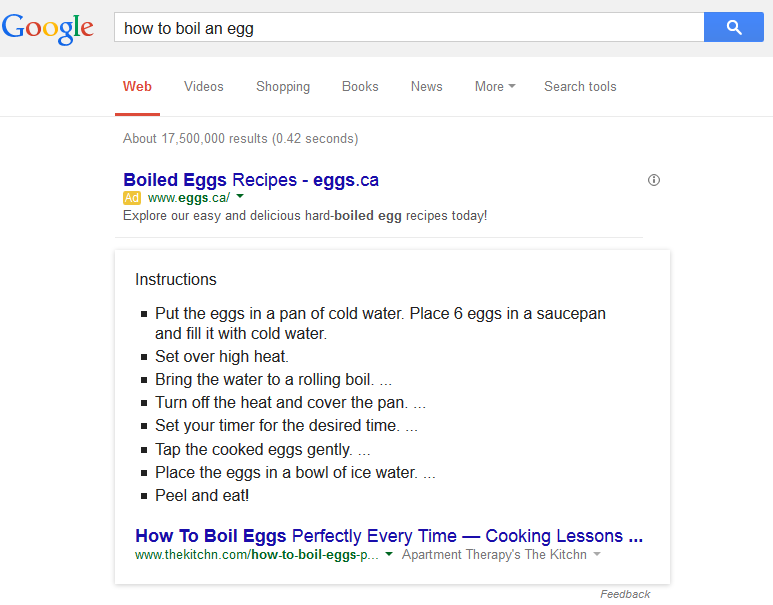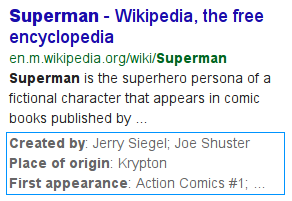Google searchers have become accustomed to seeing knowledge graph information mixed into their Google search results. Google is now taking this a step further and introducing structured snippets to some results within the Google search results.
For some queries, Google will extract specific information from the results page and include it as part of the snippet for the search result on the results page.
 The structured snippets are also available for mobile users as well.
The structured snippets are also available for mobile users as well.
Structured Snippets are a collaboration between both the web search team and Google Research.
The WebTables research team has been working to extract and understand tabular data on the Web with the intent to surface particularly relevant data to users. Our data is already used in the Research Tool found in Google Docs and Slides; Structured Snippets is the latest collaboration between Google Research and the Web Search team employing that data to seamlessly provide the most relevant information to the user. We use machine learning techniques to distinguish data tables on the Web from uninteresting tables, e.g., tables used for formatting web pages. We also have additional algorithms to determine quality and relevance that we use to display up to four highly ranked facts from those data tables.
Of course, every time Google extracts information from a webpage and includes that information in the actual search result listing, instead of leading the searcher to click on the link to find the information themselves, would very likely reduce the CTR of those results for the website owners. While it can be useful for searchers – and that is what Google is aiming to do – many webmasters won’t be happy with this change.
It also once again raises the question of where does this stop being “fair use” and start being plagiarism? After all, Google is extracting the data from a website, then displaying it so users don’t actually need to click through to the webpage – the website would lose traffic, ad revenue and other conversions they may be using. It is similar to the problem webmasters have with Google extracting significant data from a website, that would result in no one clicking through to the result, such as this example for “how to boil an egg”.
 There doesn’t appear to be a way for webmasters to opt out of either, aside from blocking Googlebot from the site completely.
There doesn’t appear to be a way for webmasters to opt out of either, aside from blocking Googlebot from the site completely.
Jennifer Slegg
Latest posts by Jennifer Slegg (see all)
- 2022 Update for Google Quality Rater Guidelines – Big YMYL Updates - August 1, 2022
- Google Quality Rater Guidelines: The Low Quality 2021 Update - October 19, 2021
- Rethinking Affiliate Sites With Google’s Product Review Update - April 23, 2021
- New Google Quality Rater Guidelines, Update Adds Emphasis on Needs Met - October 16, 2020
- Google Updates Experiment Statistics for Quality Raters - October 6, 2020

Alan Bleiweiss says
mixed bag here. Sure, some content in the snippets will be of the type likely to reduce click-through – like recipe info for people looking for quick how-to info, basic event info, or really basic stats.
Yet if that’s the case, a good percentage of that is crap that people only spend a few seconds on a site for after clicking anyhow.
The review entry for the camera is a perfect example. It’s an “in-depth” review. Anyone serious about photography and evaluating products isn’t going to be glancing at the little snippet – they’ll still want to click through.
What it comes down to mostly is whether the info in a snippet is in fact, just a commodity – which in most cases, I believe it is.
Even with the snippets – they’ll still reinforce brand awareness for the sources. So if it’s 10 seconds or a minute less on their sites, so be it. Still get brand value.
Oh no – less page views for advertising revenue though. Yeah, well that’s always been a red herring data point anyhow – archaic revenue model based on 20th century marketing concepts.
So sure – people may need to adapt – however smart marketers will take advantage of it and tap it for its potential rather than fear it.
Just my opinion…
Chip Jones says
Jennifer, you raise a really great question, albeit one heard before. I do agree (to an extent) that this would lower the CTR for that listing.but only if the snippet completely answered the users question(s).
The Google snippet provides detail about sensor resolution, weight, and display size. How would Google know that this was the information that the user was looking for with the broad search of “Nikon D7100”?
It’s likely Google is doing some sort of additional investigative work (with snippets) to find out what the user’s actual intent is. But they aren’t even linking to the site where the snippet is shown, so not sure what use this is to them. Yes, I’m sure i produces a very bad CTR for that listing.
If Google wants to use snippets from a site, then they should also make sure that those snippets are clickable and lead to the site they are listed with.